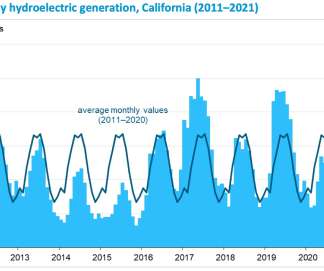EIA: California drought will decrease hydropower, increase natural gas use and CO2 emissions
Green Car Congress
MAY 27, 2022
The extended drought in California could cut the state’s summer electricity generation from hydropower nearly in half compared with normal precipitation conditions, according to an analysis by the US Energy Information Administration (EIA). Figure 2 data source: US Energy Information Administration, Electric Power Monthly.














Let's personalize your content